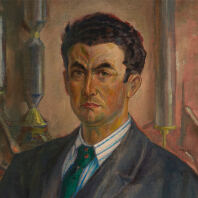Edgard Varèse
Compositeur
“At the age of twenty, I began to perceive sound as a living material that can be moulded without arbitrary restrictions,” said Edgard Varèse, who developed the vision of electronic sound production with Ferruccio Busoni as early as 1906. Throughout his life, Varèse searched for new ways of generating sound until he finally created Déserts, one of the earliest compositions to incorporate electronic elements.
Edgard Varèse, born in Paris in 1883, began his musical studies at the age of 20 – first at the Schola Cantorum under Albert Roussel, Charles Bordes and Vincent d’Indy, then at the conservatory under Charles Widor. Influenced by Parisian Futurism and Cubism, Varèse lived in Berlin from 1907 to 1914, where he met Maurice Ravel, Richard Strauss and Romain Rolland and studied under Ferruccio Busoni. When the First World War broke out, Varèse returned to Paris. After being discharged from the French army due to illness, the composer emigrated to the USA in the midst of the turmoil of war – almost penniless and without speaking a word of English. Here he wrote major works such as Amériques, Offrandes, Hyperprism, Octandre, Intégrales and Arcana in quick succession. He also worked as a conductor and founded the International Composers’ Guild with Carlos Salzedo, and the Pan American Association of Composers with Henry Cowell and Carlos Chávez. In 1928, Varèse returned to Paris and presented his revolutionary work to a European audience for the first time. After his return to the USA in 1935, he fell into a long creative crisis – partly because he did not have the electro-acoustic means to realise his sonic ideas: “Sometimes you look so far into the future that the means of expression refuse to follow, as if they were afraid.” Varèse lived in New York, in the desert of New Mexico and in California. From 1940, he worked as a conductor and teacher, but his music was practically forgotten. From 1952, he made an astonishing comeback as his works were performed and recorded. He also wrote his last works, Déserts, Poème électronique and Nocturnal, employing electro-acoustic techniques, for which he had waited so long.